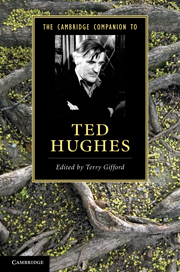Book contents
- Frontmatter
- Contents
- Acknowledgements
- Contributors
- Note on Referencing and Abbreviations
- Chronology
- Introduction
- 1 The problem of biography
- 2 The debates about Hughes
- 3 Hughes and animals
- 4 Ted Hughes and Sylvia Plath
- 5 The anthropologist’s uses of myth
- 6 Hughes’s social ecology
- 7 Hughes and feminism
- 8 Hughes and the classics
- 9 Hughes as prose writer
- 10 Hughes on Shakespeare
- 11 Class, war and the Laureateship
- 12 Hughes and his critics
- Guide to further reading
- Index
1 - The problem of biography
Published online by Cambridge University Press: 28 July 2011
- Frontmatter
- Contents
- Acknowledgements
- Contributors
- Note on Referencing and Abbreviations
- Chronology
- Introduction
- 1 The problem of biography
- 2 The debates about Hughes
- 3 Hughes and animals
- 4 Ted Hughes and Sylvia Plath
- 5 The anthropologist’s uses of myth
- 6 Hughes’s social ecology
- 7 Hughes and feminism
- 8 Hughes and the classics
- 9 Hughes as prose writer
- 10 Hughes on Shakespeare
- 11 Class, war and the Laureateship
- 12 Hughes and his critics
- Guide to further reading
- Index
Summary
All biographies are impossible, but Ted Hughes’s is more impossible than others. One of the reasons for this is that he was made a character in the life-story of Sylvia Plath. Witness the title of one of the two Ted Hughes biographies to date: Her Husband: Hughes and Plath – A Marriage. Of course, Diane Middlebrook came to Hughes from an interest in Ann Sexton and Sylvia Plath. Her approach testified to the construction of a personage called ‘Ted Hughes’ that took place early on in his own lifetime, originating in Sylvia Plath’s poems and her extremely detailed journals and letters, which are one of the main documentary sources for any Hughes biographer. The earlier biography, Elaine Feinstein’s Ted Hughes; The Life of a Poet, while still relying heavily on Plath’s writings, had already attempted to broaden the scope of what was then known by using first-hand correspondence and conversations with people who had been personally acquainted with the poet. Of course, huge new sources of information were discovered with the opening in the year 2000 of the Ted Hughes Archives in the Manuscript, Archives, and Rare Book Library of Emory University in Atlanta. This consists of a major part of Hughes’s letters, drafts, notebooks and drawings, and it provides ample material for a literary biography of Ted Hughes that could not but lead to a genuine reappraisal of the figure of both the man and the poet. The full achievement of this remains impossible, however, because part of the archive remains sealed off, withdrawn from public inspection until the year 2023.
- Type
- Chapter
- Information
- The Cambridge Companion to Ted Hughes , pp. 14 - 26Publisher: Cambridge University PressPrint publication year: 2011
- 1
- Cited by



